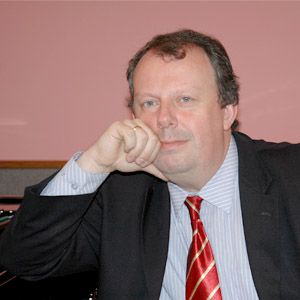|

Concert by pupils of Valery Pyasetsky on 28 December
Concert by pupils of Valery Pyasetsky on 29 December
| |
– Why, with a successful career as a concert pianist, did you decide to dedicate yourself to teaching?
– In the early 1980s, in order to start a postgraduate study you had to have an official endorsement from a music school to which you would return to work following your graduation. Without giving it much consideration I went to the Central School of Music for that “bit of paper” never thinking that it would have such consequences. Following my postgraduate studies I was sent back to the Central School of Music, initially as a concert master of the strings and the wind section, later I was allotted several students “to see how it would go”, and that’s how it all began. Next year I’ll have been working as a teacher for exactly thirty years. Today I have over thirty students in three schools – the Moscow State Tchaikovsky Conservatoire where I have the honour of being a professor, the Central School of Music and the Moscow State Chopin College of Musical Performance. My students have been prize-winners at various international competitions on more than eighty occasions.
– Who were your teachers? Do you continue to follow their principles?
– My first teacher was Anna Danilovna Artobolevskaya – a truly brilliant children’s teacher! She trained many of today’s internationally acclaimed musicians, among them my own professor, Alexei Nasedkin under whom I studied for a total of seven years. There’s one other person I just have to mention – the outstanding violinist Mikhail Emmanuilovich Khomitser – we performed together for ten years and I owe a great deal to him in terms of my development as a musician.
– What criteria guide you when selecting students? What qualities – in your opinion – are the most important for an emerging pianist?
– In my view the most important qualities are passion, diligence to the point of self-denial, patience, willpower, individuality, artistry and drive or charisma – call it what you like.
– You have a huge class at the Central School of Music – what do you think is the most difficult aspect of working with children and with what should children’s music education begin?
– When working with children, the most important thing for a teacher is incredible patience. You can never be driven by the idea of instant success. You have to approach your aim gradually, step by step. Teaching should be your raison d’être – only then can you think of being successful in this demanding profession. A child’s music education should begin long before his or her first lesson. The family as a unit has to love music and this must be manifested in various forms. Subconsciously to start with, and later with the direct aim of instilling the child with an interest in music. Here a decisive role lies with the parents and grandparents.
– What does the experience of participating in such festivals give your students?
– Taking part in a festival like yours is a dream for any concert pianist. It provides tremendous experience and it is impossible to overestimate its importance for a young musician. I would like to express particular gratitude to maestro Valery Gergiev because, taking into account his incredibly intense schedule of concert performances, he has found time to present these young musicians to St Petersburg audiences in person. Appearing on this amazing stage with the Mariinsky Orchestra under the baton of the maestro himself is sheer bliss, something that will remain with each of these young people forever as an unforgettable event. I take my hat off to you!
– What do you personally understand by the phrase “the Russian piano school”?
– Nowadays everyone can play fast, incredibly fast even. Playing the piano is frequently akin to a sports competition about who can perform faster or louder and often this means the real purpose of the pianist’s appearance onstage can be forgotten. What is the music about? What do you want to convey to the audience and do you actually have anything to convey? Dazzling virtuoso skill should only be a means of embodying the main goal – to convey the idea of the music being performed. Intellect, culture, spirituality – the soul, if you like – these are the main features of the Russian piano school.
|